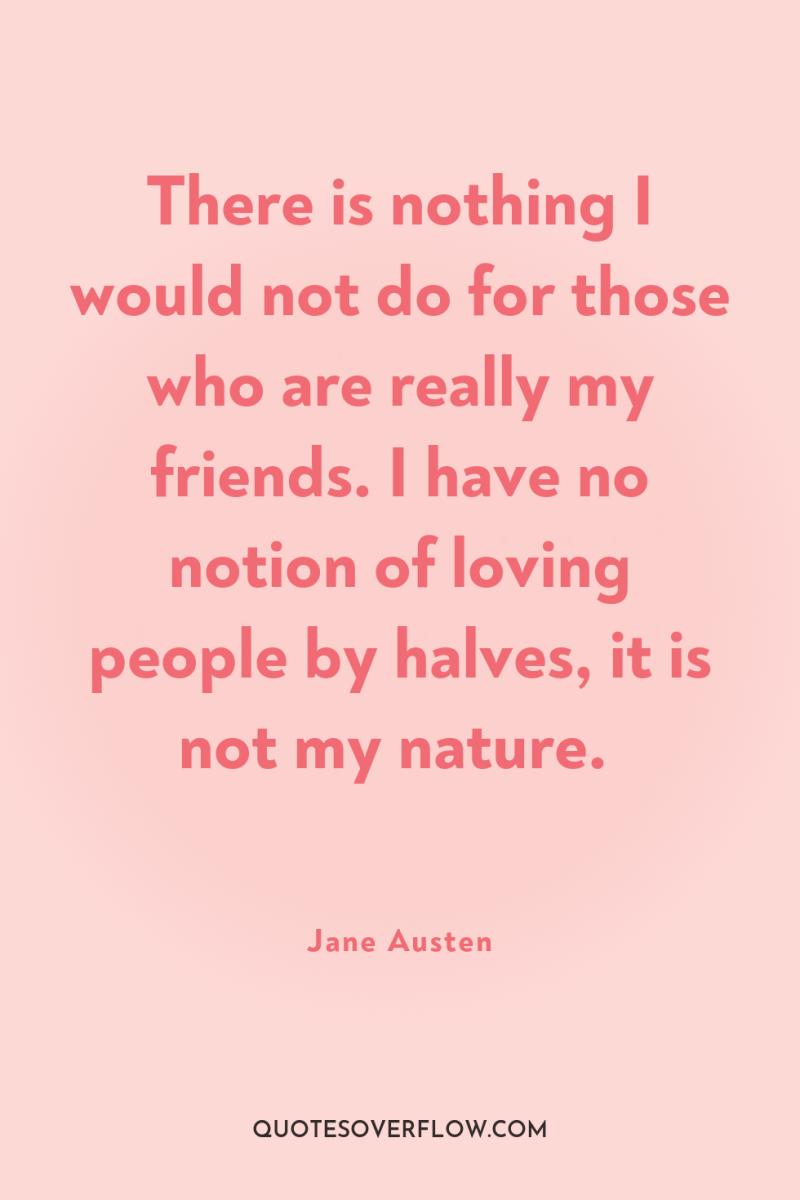
1
There is nothing I would not do for those who are really my friends. I have no notion of loving people by halves, it is not my nature.Jane Austen
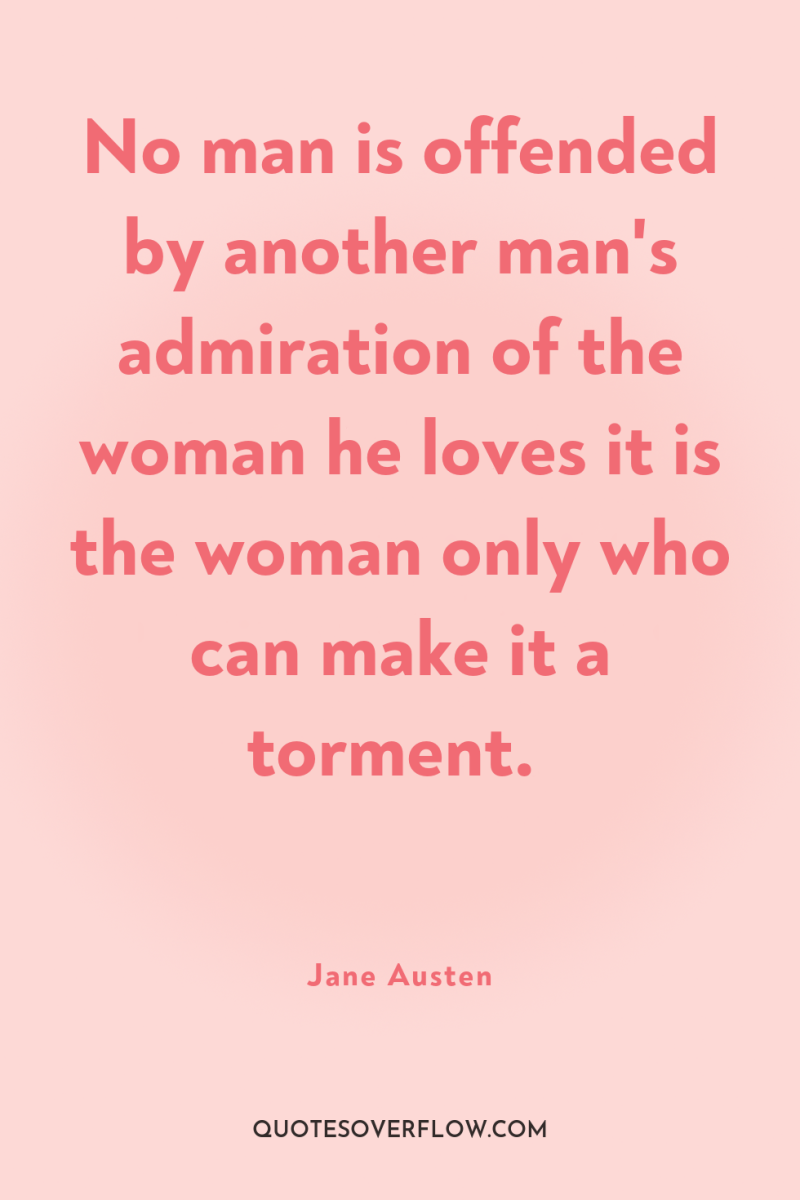
2
No man is offended by another man's admiration of the woman he loves it is the woman only who can make it a torment.Jane Austen
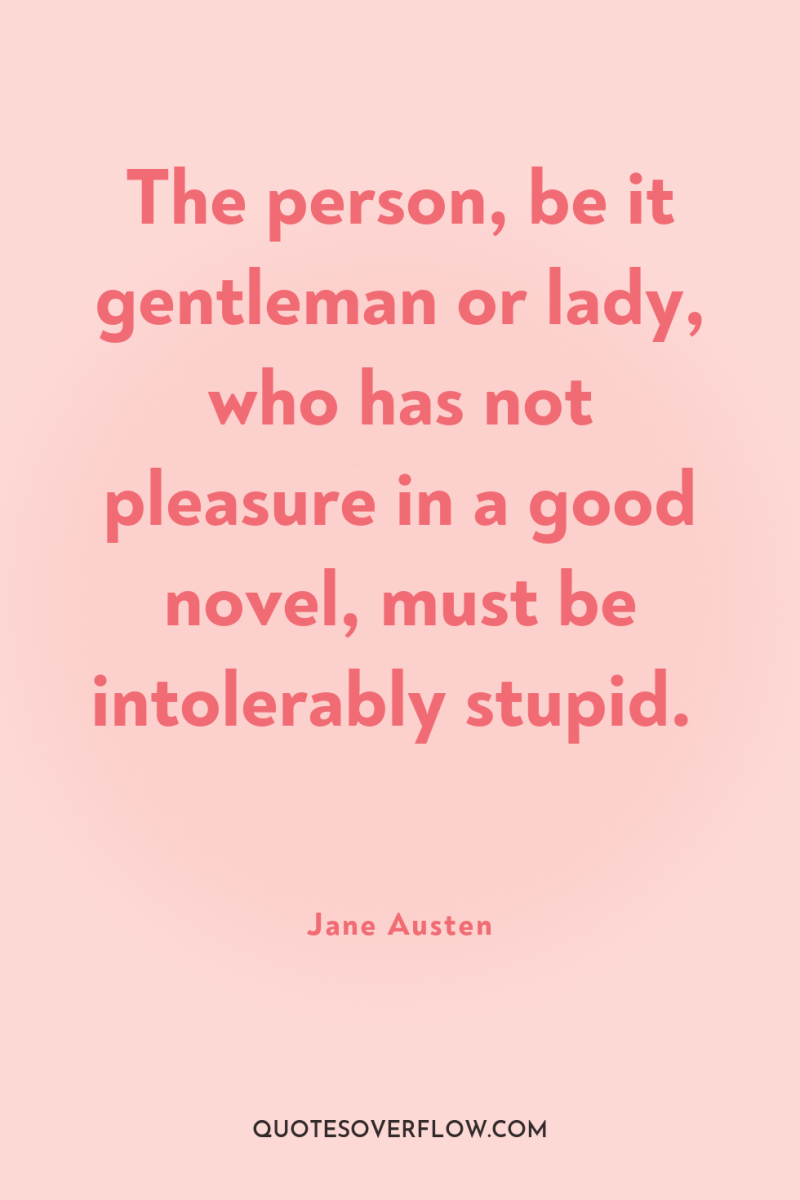
3
The person, be it gentleman or lady, who has not pleasure in a good novel, must be intolerably stupid.Jane Austen
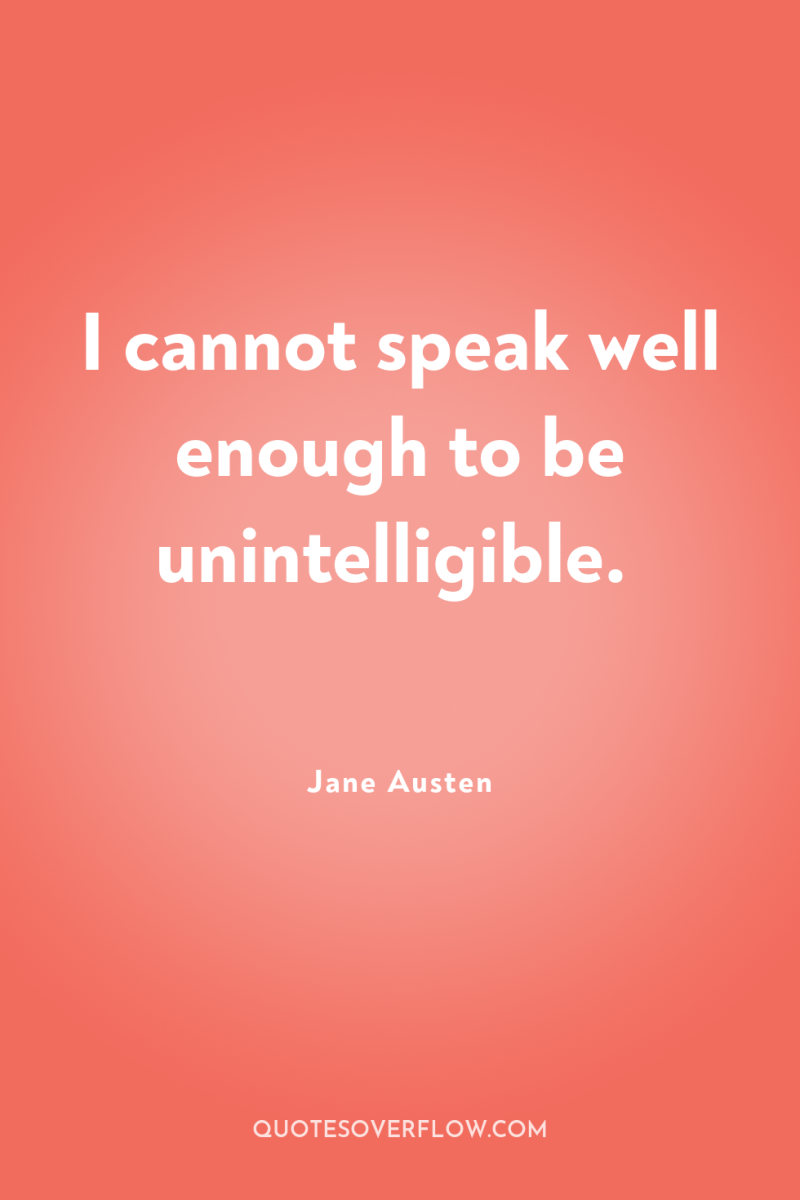
4
I cannot speak well enough to be unintelligible.Jane Austen
5
Biti dobro upućen u stvari znaÄi liÅ¡iti druge mogućnosti da udovolje svojoj taÅ¡tini, Å¡to će pametan Äovek uvek nastojati da izbegne.Jane Austen
![[I]t is well to have as many holds upon happiness...](https://cdn.quotesoverflow.com/file/quotesoverflow/images/it-is-well-to-have-as340473518634-1200.webp)
6
[I]t is well to have as many holds upon happiness as possible.Jane Austen
7
…she had nothing to do but to forgive herself and be happier than ever…Jane Austen
8
It would be mortifying to the feelings of many ladies, could they be made to understand how little the heart of a man is affected by what is costly or new in their attire.. Woman is fine for her own satisfaction alone. No man will admire her the more, no woman will like her the better for it. Neatness and fashion are enough for the former, and a something of shabbiness or impropriety will be most endearing to the latter. .Jane Austen
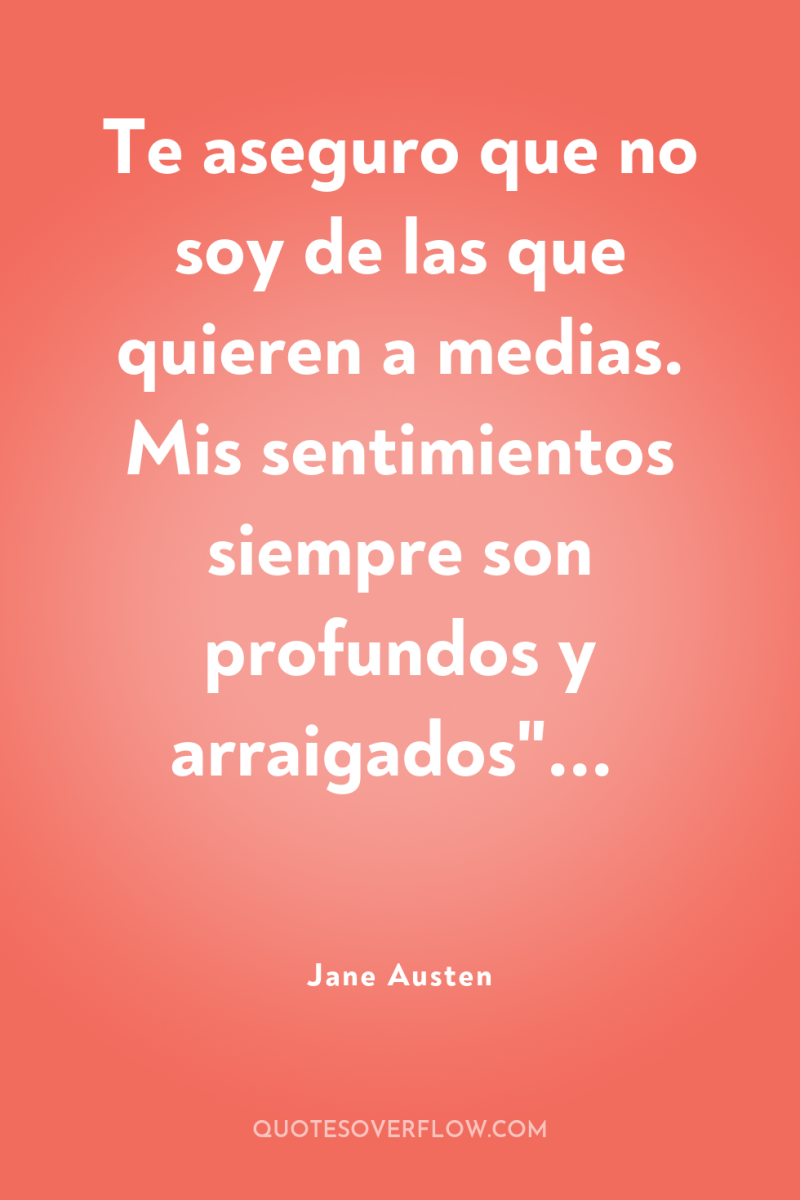
9
Te aseguro que no soy de las que quieren a medias. Mis sentimientos siempre son profundos y arraigados"...Jane Austen
10
She was heartily ashamed of her ignorance - a misplaced shame. Where people wish to attach, they should always be ignorant. To come with a well−informed mind is to come with an inability of administering to the vanity of others, which a sensible person would always wish to avoid. A woman especially, if she have the misfortune of knowing anything, should conceal it as well as she can.Jane Austen
11
The advantages of natural folly in a beautiful girl have been already set forth by the capital pen of a sister author; and to her treatment of the subject I will only add, in justice to men, that though to the larger and more trifling part of the sex, imbecility in females is a great enhancement of their personal charms, there is a portion of them too reasonable and too well informed themselves to desire anything more in woman than ignorance.Jane Austen
12
...it is very well worth while to be tormented for two or three years of one's life, for the sake of being able to read all the rest of it. Consider - if reading had not been taught, Mrs. Radcliffe would have written in vain - or perhaps might not have written at all.Jane Austen
13
It is only a novel... or, in short, only some work in which the greatest powers of the mind are displayed, in which the most thorough knowledge of human nature, the happiest delineation of its varieties, the liveliest effusions of wit and humour, are conveyed to the world in the best-chosen languageJane Austen
14
I am no novel-reader -- I seldom look into novels -- Do not imagine that I often read novels -- It is really very well for a novel." Such is the common cant. "And what are you reading, Miss -- ?" "Oh! It is only a novel! " replies the young lady, while she lays down her book with affected indifference, or momentary shame. "It is only Cecilia, or Camilla, or Belinda"; or, in short, only some work in which the greatest powers of the mind are displayed, in which the most thorough knowledge of human nature, the happiest delineation of its varieties, the liveliest effusions of wit and humour, are conveyed to the world in the best-chosen language.Jane Austen
15
You feel, I suppose, that, in losing Isabella, you lose half yourself: you feel a void in your heart which nothing else can occupy. Society is becoming irksome; and as for the amusements in which you were wont to share at Bath, the very idea of which without her is abhorrent. You would not, for instance, now go to a ball for the world. You feel that you have no longer any friend to whom you can speak with unreserve; on whose regard you can place dependence; or whose counsel, in any difficult, you could rely on.Jane Austen
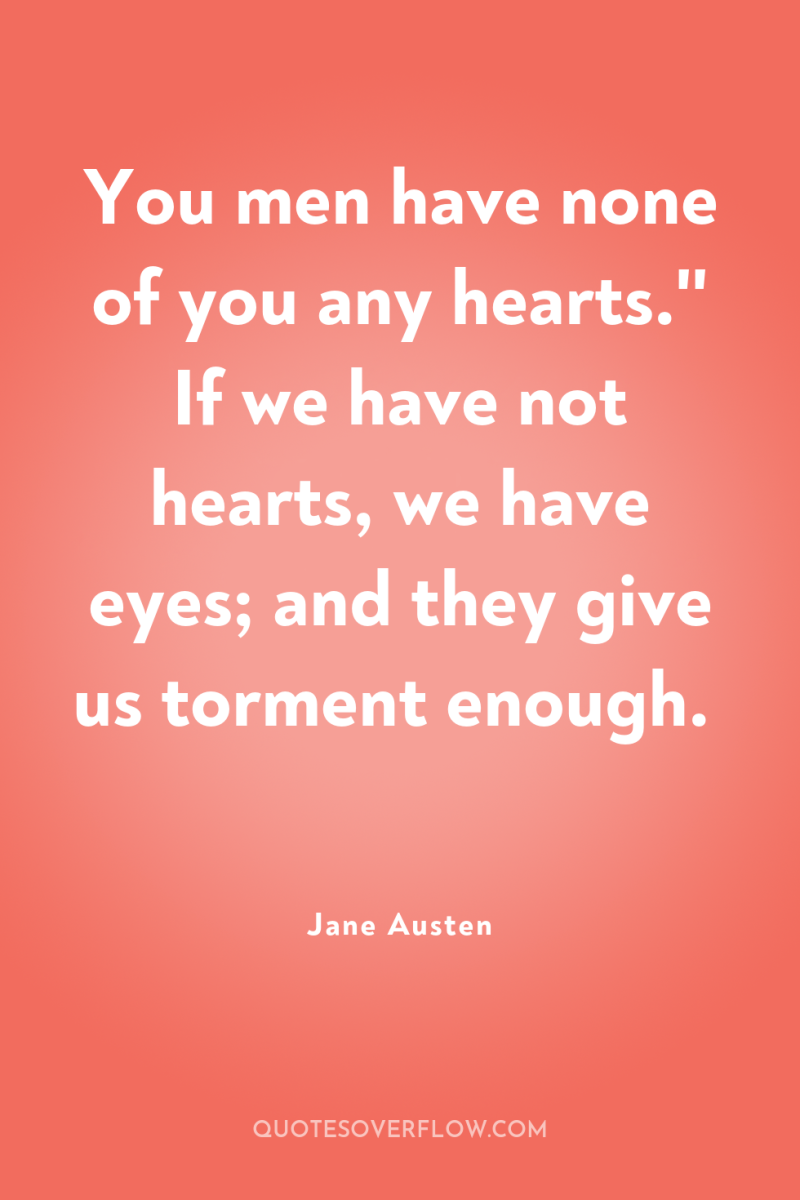
16
You men have none of you any hearts.'' If we have not hearts, we have eyes; and they give us torment enough.Jane Austen
17
And such is your definition of matrimony and dancing. Taken in that light, certainly their resemblance is not striking; but I think I could place them in such a view. You will allow that in both man has the advantage of choice, woman only the power of refusal; that in both it is an engagement between man and woman, formed for the advantage of each; and that when once entered into, they belong exclusively to each other till the moment of its dissolution; that it is their duty each to endeavor to give the other no cause for wishing that he or she had bestowed themselves elsewhere, and their best interest to keep their own imaginations from wandering towards the perfections of their neighbors, or fancying that they should have been better off with any one else.Jane Austen
18
But Catherine did not know her own advantages - did not know that a good-looking girl, with an affectionate heart and a very ignorant mind, cannot fail of attracting a clever young man, unless circumstances are particularly untoward.Jane Austen
19
The past, present, and future, were all equally in gloom.Jane Austen
20
His departure gave Catherine the first experimental conviction that a loss may be sometimes a gain.Jane Austen
21
A loss may be sometimes a gain.Jane Austen
22
There is nothing I would not do for those who are really my friends. I have no notion of loving people by halves, it is not my natureJane Austen
23
I assure you. I have no notion of treating men with such respect. That is the way to spoil them.Jane Austen
24
Where people are really attached, poverty itself is wealth.Jane Austen
25
If I could not be persuaded into doing what I thought wrong, I will never be tricked into it.Jane Austen
26
I leave it to be settled, by whomsoever it may concern, whether the tendency of this work be altogether to recommend parental tyranny, or reward filial disobedience.Jane Austen
27
[Mrs. Allen was] never satisfied with the day unless she spent the chief of it by the side of Mrs. Thorpe, in what they called conversation, but in which there was scarcely ever any exchange of opinion, and not often any resemblance of subject, for Mrs. Thorpe talked chiefly of her children, and Mrs. Allen of her gowns.Jane Austen
28
She hated herself more than she could express.Jane Austen
29
But the inexplicability of the General's conduct dwelt much on her thoughts. That he was very particular in his eating, she had, by her own unassisted observation, already discovered; but why should he say one thing so positively, and mean another all the while, was most unaccountable. How were people, at that rate, to be understood?Jane Austen
30
To begin perfect happiness at the respective ages of twenty-six and eighteen, is to do pretty well; and professing myself moreover convinced, that the General's unjust interference, so far from being really injurious to their felicity, was perhaps rather conducive to it, by improving their knowledge of each other, and adding strength to their attachment, I leave it to be settled by whomsoever it may concern, whether the tendency of this work be altogether to recommend parental tyranny, or reward filial disobedience.Jane Austen
31
…each found her greatest safety in silence…Jane Austen
32
Young people do not like to be always thwarted.Jane Austen
33
A distinction to which they had been born gave no pride.Jane Austen
34
If I am wrong, I am doing what I believe to the right.Jane Austen
35
What a revolution in her ideas!Jane Austen
36
Provided that nothing like useful knowledge could be gained from them, provided they were all story and no reflection, she had never any objection to books at all.Jane Austen
37
I am fond of history and am very well contented to take the false with the true. In the principal facts they have sources of intelligence in former histories and records, which may be as much depended on, I conclude, as anything that does not actually pass under ones own observation; and as for the little embellishments you speak of, they are embellishments, and I like them as such.Jane Austen
38
And now I may dismiss my heroine to the sleepless couch, which is the true heroine's portion - to a pillow strewed with thorns and wet with tears. And lucky may she think herself, if she get another good night's rest in the course of the next three months.Jane Austen
39
Catherine had never wanted comfort more, and [Henry] looked as if he was aware of it.Jane Austen
40
But history, real solemn history, I cannot be interested in. Can you?"" Yes, I am fond of history."" I wish I were too. I read it a little as a duty, but it tells me nothing that does not either vex or weary me. The quarrels of popes and kings, with wars or pestilences, in every page; the men all so good for nothing, and hardly any women at all -- it is very tiresome.Jane Austen
41
How I hate the sight of an umbrella!Jane Austen
42
..it is indeed a street of so impertinent a nature, so unfortunately connected with the great London and Oxford roads, and the principal inn of the city, that a day never passes in which parties of ladies, however important their business, whether in quest of pastry, millinery, or even (as in the present case) of young men, are not detained on one side or other by carriages, horsemen, or carts. This evil had been felt and lamented, at least three times a day, by Isabella since her residence in Bath..Jane Austen
43
And if a rainy morning deprived them of other enjoyments, they were still resolute in meeting in defiance of wet and dirt, and shut themselves up, to read novels together. Yes, novels; for I will not adopt that ungenerous and impolitic custom so common with novel—writers, of degrading by their contemptuous censure the very performances, to the number of which they are themselves adding – joining with their greatest enemies in bestowing the harshest epithets on such works, and scarcely ever permitting them to be read by their own heroine, who, if she accidentally take up a novel, is sure to turn over its insipid pages with disgust. Alas! If the heroine of one novel be not patronized by the heroine of another, from whom can she expect protection and regard? I cannot approve of it. Let us leave it to the reviewers to abuse such effusions of fancy at their leisure, and over every new novel to talk in threadbare strains of the trash with which the press now groans. Let us not desert one another; we are an injured body. Although our productions have afforded more extensive and unaffected pleasure than those of any other literary corporation in the world, no species of composition has been so much decried. From pride, ignorance, or fashion, our foes are almost as many as our readers. And while the abilities of the nine—hundredth abridger of the History of England, or of the man who collects and publishes in a volume some dozen lines of Milton, Pope, and Prior, with a paper from the Spectator, and a chapter from Sterne, are eulogized by a thousand pens – there seems almost a general wish of decrying the capacity and undervaluing the labour of the novelist, and of slighting the performances which have only genius, wit, and taste to recommend them. “I am no novel—reader – I seldom look into novels – Do not imagine that I often read novels – It is really very well for a novel.” Such is the common cant. “And what are you reading, Miss – ?” “Oh! It is only a novel! ” replies the young lady, while she lays down her book with affected indifference, or momentary shame. “It is only Cecilia, or Camilla, or Belinda”; or, in short, only some work in which the greatest powers of the mind are displayed, in which the most thorough knowledge of human nature, the happiest delineation of its varieties, the liveliest effusions of wit and humour, are conveyed to the world in the best—chosen language. Now, had the same young lady been engaged with a volume of the Spectator, instead of such a work, how proudly would she have produced the book, and told its name; though the chances must be against her being occupied by any part of that voluminous publication, of which either the matter or manner would not disgust a young person of taste: the substance of its papers so often consisting in the statement of improbable circumstances, unnatural characters, and topics of conversation which no longer concern anyone living; and their language, too, frequently so coarse as to give no very favourable idea of the age that could endure it.Jane Austen
44
The anxiety, which in this state of their attachment must be the portion of Henry and Catherine, and of all who loved either, as to its final event, can hardly extend, I fear, to the bosom of my readers, who will see in the tell-tale compression of the pages before them, that we are all hastening together to perfect felicity.Jane Austen